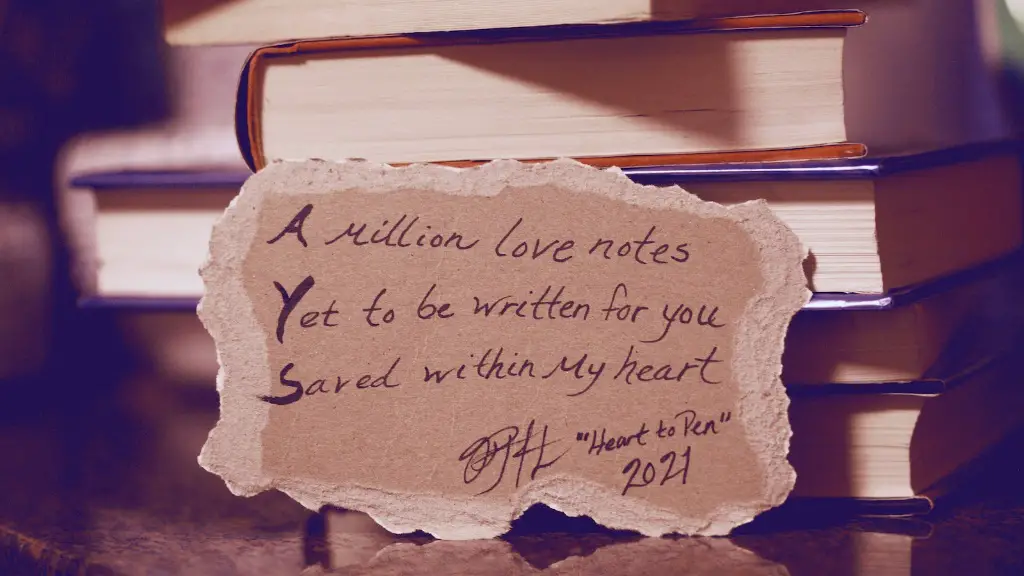Why are certain forms of poetry called open forms
Certain forms of poetry are becoming more and more popular and they are known as open forms. These kinds of poetry differ from the traditional forms of poetry in that they do not have a set of rules or a structure that needs to be followed to the letter. Instead, open forms of poetry allow creativity and innovation to flow into the equation, allowing poets to express themselves in more free-form ways.
The main difference between traditional forms of poetry, like sonnets and haiku, and open forms of poetry, is that there is no limitation with the open forms. The poet is free to express their emotions and ideas without fear of breaking any rules. This freedom of expression has allowed poets to venture further out into the creative realms and is why open forms of poetry have become increasingly popular.
Open forms of poetry offer writers the chance to express, without having to adhere to established rules. This enables them to explore topics and themes in greater depth, as they are no longer restricted by the structure and conventions of traditional forms of poetry. For example, a poet can choose to write a love poem in an open form, and might explore topics such as love, the meaning of love, and the variety of forms that love can take.
Open forms of poetry can also be seen as more accessible than other forms of poetry, which are often rooted in classical techniques and language. The use of language and techniques, such as rhyme and rhythm, can be seen as an obstacle to understanding. Open forms of poetry, however, enable the reader to access and appreciate these kinds of poetry by stripping away some of the complicated elements and leaving only the power of the poet’s words and ideas.
The use of open forms of poetry has become commonplace in the modern world, particularly with the rise of the internet and social media. Many people, regardless of age and experience, are using open forms of poetry to express themselves because of their relatability and informality. Poets are finding themselves empowered by the ability to express their thoughts and feelings without the added restrictions of traditional forms of poetry.
In the world of modern literature, open forms of poetry provide an open platform for experimentation and exploration. This kind of freedom has been embraced by poets and readers alike, and it has led to a surge in creativity and innovation. Open forms of poetry are stimulating and exciting, touch on deep emotion and complex subject matter, and encourages both the poet and the reader to explore new ideas.
Practicality of Open Forms of Poetry
Open forms of poetry are practical in that they allow poets to convey ideas in ways that would not be possible with traditional forms of poetry. Open forms of poetry enable poets to express themselves without having to adhere to the strict rules and regulations of traditional forms of poetry. This freedom allows poets to explore their creative sides and push the boundaries of language and expression. Additionally, open forms of poetry also allow poets to express themselves in a more conversational and informal tone, which is often more relatable and accessible to readers.
Open forms of poetry also lend themselves more easily to physical performance. Rather than having to memorize a poem or say it in a specific way, performers of open forms of poetry can speak in a more natural and organic way. This makes it easier to convey their emotions and ideas, as there is less pressure to conform to preset rules. Open forms of poetry can also be seen as a more liberating tool for writers, as they no longer have to worry about the age-old laws of poetic traditions.
The Impact of Open Forms of Poetry
The rise of open forms of poetry has had a major impact on the literary world. More and more poets are turning to open forms of poetry because of its accessibility and informality. This has led to a surge in creativity, as poets are no longer bound by traditional constraints. Additionally, it has allowed poets to delve into traditionally inaccessible topics, such as mental health and social issues, without fear of breaking the rules of traditional forms of poetry.
The use of open forms of poetry to express oneself has also had a positive effect on society. By allowing poets to express themselves honestly and openly, it has offered them a platform to share their stories and experiences. This has opened up conversations on difficult topics and has enabled people to connect with each other in ways that were not possible before. In this way, open forms of poetry have become a powerful tool for change and progress.
The Future of Open Forms of Poetry
Open forms of poetry are here to stay and have become much more commonplace in the literary world. More and more poets are embracing the freedom that it provides and experimenting with the creative possibilities. Additionally, readers are beginning to appreciate them more and are finding ways to deepen their understanding and engagement with these poems. It is clear, then, that open forms of poetry are here to stay.
The future of open forms of poetry looks bright and the possibilities are endless. With the rise of the internet and the power of social media, poets have more avenues than ever to express themselves. Poets are no longer limited to the traditional forms of poetry, instead they can craft their own unique works that are tailored to their needs and experiences. With this kind of freedom, the possibilities of open forms of poetry are truly exciting.
How To Use Open Forms of Poetry
Open forms of poetry can be used in a variety of ways. Some poets will use them to express themselves or explore difficult topics, while others may use them as an outlet to explore their creativity. There is no right or wrong way to use open forms of poetry, the key is to find a method that works for you. Here are some tips on how to use open forms of poetry:
- Start simple – start by writing about a simple topic or idea and gradually build on it as you gain more confidence.
- Explore different themes – dive into different topics and experiment with different styles and techniques.
- Read other open forms of poetry – reading other open forms of poetry can provide you with inspiration and important insights.
- Share your work – share your work with others and get feedback and constructive criticism.
- Have fun – don’t forget to have fun and enjoy writing open forms of poetry.
Conclusion
Open forms of poetry are an exciting and liberating form of poetry. They enable poets to express themselves without having to conform to traditional forms of poetry and provide an avenue for them to explore their creativity. This has led to a surge in creativity and innovation in the literary world and it has opened up conversations on difficult topics and enabled people to connect with each other. Open forms of poetry are here to stay and the possibilities are truly exciting.



